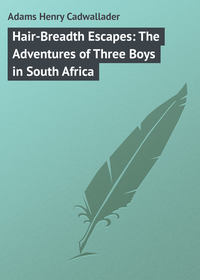Kitabı oku: «Hair-Breadth Escapes: The Adventures of Three Boys in South Africa», sayfa 25
Appendix
The Hottentot God
The worship of the beetle by the Hottentots has been disputed. No doubt it has not been their practice during the last fifty years. But that it existed in more ancient times, is (I think) abundantly proved by the evidence of trustworthy writers. Kolben, for example, has the following explicit statement, made from his own experience.
“The Hottentots adore as a benignant Deity, a certain insect, peculiar (it is said) to the Hottentot countries. This animal is of the dimensions of a child’s little finger; the back green, the belly speckled white and red. It is provided with two wings and two horns. To this little winged Deity, whenever they set eyes on it, they render the highest tokens of veneration. If it honours their kraal with a visit, the inhabitants assemble round it with transports of devotion, as if the Lord of the Universe was come among them. If the insect happens to alight on a Hottentot, he is looked upon as a man without guilt, and distinguished and reverenced as a saint and the delight of the Deity ever after. They declared to me that if this deified insect had been killed, all their cattle would certainly have been destroyed by wild beasts, and they themselves, every man, woman, and child of them, brought to a miserable end.” —Kolben, volume one, page 99.
Kaffir Prophets
The scriptural curse of the “false prophet” has never been more strikingly fulfilled, than in the instance of the Kaffir nation in the year 1856. A false prophet, named Umhlahara, professed to have received a revelation from heaven through the visions of a girl, commanding the Kaffirs to kill the whole of their cattle, and promising that, in the event of their obedience, all their forefathers, together with their cattle, should rise to life again, that they should regain their ascendancy in the land, and live in plenty and prosperity for evermore. The object of this audacious imposture was to reduce the whole nation on a sudden to such a state of suffering that, in their desperation, they would burst in upon the settlements of the white men, and everywhere exterminate them. It is strange that in a country where the flocks and herds constitute the sole wealth of the people, such an attempt should have succeeded. But it did so to a considerable extent, at all events. Those who had contrived it, however, had made one fatal omission. They ought to have concentrated the whole people on the English border, and they forgot that men enfeebled by famine would be unfitted for warfare, or indeed for any lengthened travel. An attempt was made to remedy the blunder by postponing the day of the resurrection of the chiefs and cattle, but it failed. The people had discovered the imposture, though not until they were reduced to the most frightful condition of starvation. The English colonists did all that lay in their power to relieve them, but they were wholly unable to remedy the mischief. Vast numbers died everywhere by the most terrible of all deaths, and the strength of the nation was so completely broken by the disaster, that they were rendered wholly incapable of continuing the warfare, for which in former days they had been so renowned.
Wreck of the Grosvenor
All the particulars of the wreck of this ill-fated vessel have been given in the narrative. The whole of the crew and passengers, except seventeen, escaped safe to land, to the number of one hundred and fifty. In accordance with the proposal of the captain, they endeavoured to make their way overland to Cape Town; but after a few days’ travel, during which they were harassed by the Kaffirs with repeated attacks, a fresh consultation took place. Forty-three able-bodied men persevered in the attempt. Of these, some three or four, after terrible perils and hardships, succeeded in reaching Cape Town. What became of those who were left has never been certainly known. Rumours, which are mentioned by Le Vaillant and others, declare that some women at all events survived, and were compelled to become the wives of native chiefs. An expedition was even sent out to search for these, but failed, more apparently from want of capacity in those conducting it than from anything else. Under these circumstances the fate of those who remained behind may, not unfairly, be made the subject of fiction.
